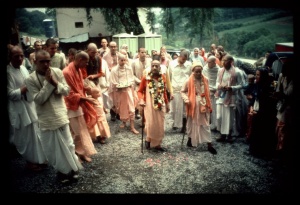SB 1.4.5 (1962)

A.C. Bhaktivedanta Swami Prabhupada
TEXT No. 5
Dristwa anuyantan atamjam api anagnam Devyo hria paridadhur na sutasya chitram Tabikshya prichhati munou jagaduh taba asti Stripum bhida natu sutasya vivikta dristeh.
ENGLISH SYNONYMS
Dristwa—by seeing, anuyantam—following, atmajam—his son, api—inspite of, anagnam—not naked, devyo—beautiful damsels, Hria—out of shyness, Paridadhur—covered the body, Na—not, Sutasya—of the sons, Chitram—astonishing, tadbikshya—by seeing that, Prichhati—asking, munou—unto the Muni (Vyas), Jagaduh—replied, Taba—your, Asti—there is, Stripum—male and female, Bhida—differences, Na—not, Tu—but, Sutasya—of the son, Vivikta—purified, Driste—of one who looks.
TRANSLATION
While Sri Vyasdeva although not naked was following His son, the beautiful young damsels who were taking bath naked, covered their body with cloth but did not do so when His son passed them before. On this the sage enquired and the young ladies replied that his son had purified his acts of looking on and he had no distinction between male and female while the sage had such distinction.
PURPORT
In the Bhagwat Geeta it is said that a learned sage looks equally on the learned and gentle Bharhmin and a chandala, a dog or cow on account of sipritual vision. Srila Sukadeva Goswami attained that stage and thus he did not see a male or female but he saw all living entities in different dresses. The ladies who were taking bath had special qualification to understand the mind of a man simply by studying the looking posture. Just like the child looks and one can understand how innocent he is. Sukdeva Goswami was a young boy of 16 years old and therefore all the parts of his body were in developed condition. He was naked also and so also the ladies taking the bath. But because Sukdeva Goswami was in transcendental position of sex relation his looking was very innocent which had nothing to do with worldly affairs. The ladies by their special qualification could know it at once and therefore they were not very serious about Him. But when his father passed the ladies following Sukdeva Goswami, the ladies dressed them properly to cover the parts of the body. Vyasadeva was an old man and he was dressed also. The ladies were exactly like his children or grandchildren and yet they took the presence of Vyasdeva just in the social custom because Srila Vyasadeva played the part of a householder. A householder has to distinguish between a male and female. Otherwise he cannot be householder. One should, therefore, attempt to know the distinction between spirit and soul practically without any attachment for male and female affinity. So long such affinity is there one should not try to become a 'Sanyasi' like Sukdeva Goswami. At least theoretically one must be convinced that a living entity is neither a male or female. The outward dress is made of matter by the material nature to attract the opposite sex and thus keep one entangled in the material existence. A liberated soul is above this perverted knowledge and he has nothing to distinguish from one living being to another. For him they are all one and the same spirit. Perfection of this spiritual vision is liberated stage and Srila Sukadeva Goswami attained that stage. Srila Vyasadeva was also in the transcendental stage but because he was in the householder's life, he did not pretend to become a liberated soul as a matter of custom.